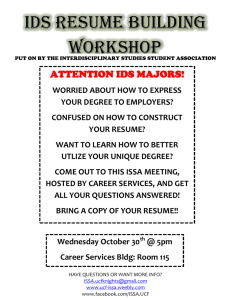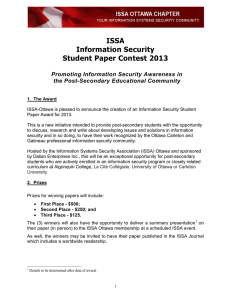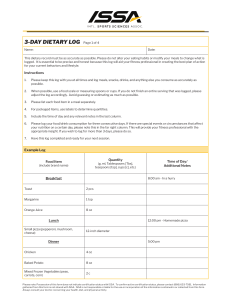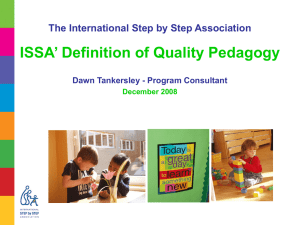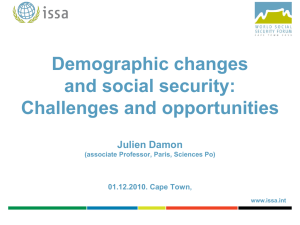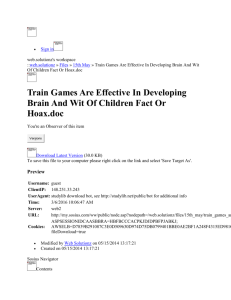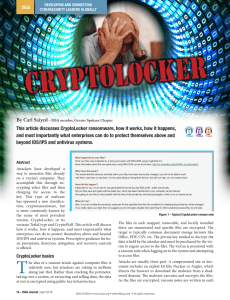Institute of Space Science and Astronomy Some of the Members Kristian Zarb Adami
advertisement
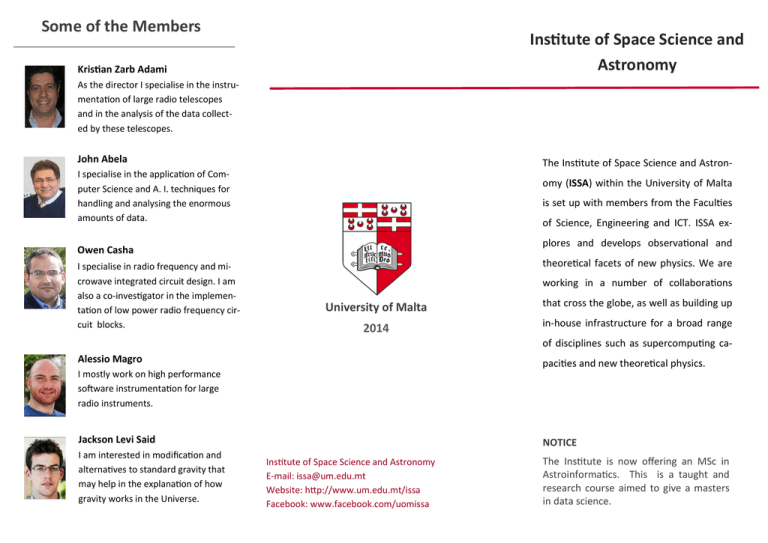
Some of the Members Institute of Space Science and Astronomy Kristian Zarb Adami As the director I specialise in the instrumentation of large radio telescopes and in the analysis of the data collected by these telescopes. John Abela The Institute of Space Science and Astron- I specialise in the application of Computer Science and A. I. techniques for handling and analysing the enormous amounts of data. omy (ISSA) within the University of Malta is set up with members from the Faculties of Science, Engineering and ICT. ISSA explores and develops observational and Owen Casha I specialise in radio frequency and microwave integrated circuit design. I am also a co-investigator in the implementation of low power radio frequency circuit blocks. theoretical facets of new physics. We are working in a number of collaborations University of Malta that cross the globe, as well as building up 2014 in-house infrastructure for a broad range of disciplines such as supercomputing ca- Alessio Magro pacities and new theoretical physics. I mostly work on high performance software instrumentation for large radio instruments. Jackson Levi Said I am interested in modification and alternatives to standard gravity that may help in the explanation of how gravity works in the Universe. NOTICE Institute of Space Science and Astronomy E-mail: issa@um.edu.mt Website: http://www.um.edu.mt/issa Facebook: www.facebook.com/uomissa The Institute is now offering an MSc in Astroinformatics. This is a taught and research course aimed to give a masters in data science. Masters of Science in Astroinformatics The MSc in Astroinformatics is meant to provide students with mathematical and statistical skills as well as the programming and modelling skills re- HP 20 GHz RF Network Analyser quired to work in measuring S-parameters of a big data science. microstrip filter Some of the skills acquired during the course includes: Current Research in the Institute ISSA is involved in a wide range of research activities many of which are in collaboration with foreign partners. We are actively working on the following: High performance software instrumentation for radio telescopes GPU-based pipelines for radio astronomy Monitoring and control infrastructure for large radio instruments Mapping out dark matter through weak gravitational lensing Analytical analysis Physical and Mathematical modelling Low aperture array antenna design Computational Modelling, Quantitative and Qualitative Interpretation of Data Antenna placement optimisation for aperture arrays Alternative theories of gravity Problem Solving Skills Cosmology as a test of modified gravity The ability to carry out unsupervised work will be fostered through the provision of a variety of projects. This will also allow for hands on experience which is highly valued with prospected employers. System deployment at the GMRT, India CUDA Research Center ISSA, in collaboration with the University of Malta’s Department of Physics and the Faculty of Information and Communications Technology, has been awarded the title of 'CUDA Research Center' by NVIDIA. This prestigious title is awarded to research groups at universities in recognition of the world changing research being undertaken using NVIDIA's massively parallel CUDA compute platform and NVIDIA GPUs. ISSA is applying NVIDIA technologies to address the exceptional computational requirements of large scale radio telescopes, with special emphasis on the Square Kilometer Array (SKA). Through local research, as well as collaboration with several international institutions, ISSA has made significant advances in meeting these requirements.
